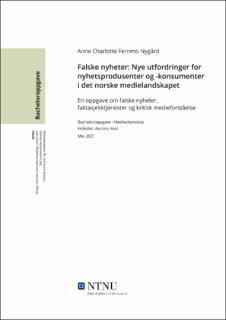| dc.contributor.advisor | Hoel, Aurora | |
| dc.contributor.author | Nygård, Anne Charlotte Fernmo | |
| dc.date.accessioned | 2021-09-14T16:14:26Z | |
| dc.date.available | 2021-09-14T16:14:26Z | |
| dc.date.issued | 2021 | |
| dc.identifier | no.ntnu:inspera:76651034:49499665 | |
| dc.identifier.uri | https://hdl.handle.net/11250/2776669 | |
| dc.description.abstract | Det hevdes at vi lever i et postfaktuelt samfunn der skillet mellom pålitelige og falske nyhetskilder er blitt mer uklart. Falske nyheter har gjort seg relevant i norske nyhetsmedier, der sensasjon og drama settes ofte før logikk, objektivitet og saklighet. Det stiller store utfordringer til den journalistiske praksisen, etablerte og alternative medieredaksjoner og nyhetskonsumenter. Denne oppgaven foreslår en tilnærming til det komplekse ”fake news”-fenomenet gjennom en casestudie av faktasjekktjenesten Faktisk.no og kvalitative intervju. Den undersøker hvordan falske nyheter påvirker norsk journalistikk og hvilket ansvar som hviler på alle som produserer og deler digitale nyheter. Oppgaven finner at faktasjekktjenester, nyhetsprodusenter og publikum har et felles ansvar om å rendyrke nyhetsjournalistikken. Derfor er nyhetskonsumentens mediekompetanse, digitale kompetanse og kritiske medieforståelse viktig for å opprettholde troverdig og demokratisk meningsutveksling. | |
| dc.description.abstract | There is consensus in the literature surrounding the topic of fake news. Within the current “post-truth era” the uncertainty between reliable and unreliable sources is increasingly expanding. Fake news is a continuously relevant topic in Norwegian news media, where sensationalism and dramatic effects often undermine logic and facts. Therefore, the practice of journalism is under a critical review, and it sets challenges for established and alternative news publishers as well as news consumers. Thus, this current case study is proposing an alternative approach to the complex phenomenon of fake news through a case study on the fact-checking organization Faktisk.no and qualitative interviews. This case is providing additional evidence to the literature by looking at how fake news have affected the Norwegian practice of journalism and by examining the responsibility of both public and individual broadcasters. This study has found a shared responsibility between fact-checking organizations, news producers and consumers in the cultivation of reliable news journalism. Therefore, to uphold authentic and democratic exchanges of opinions, we rely on news consumers’ ability to practice media literacy, digital literacy and critical information literacy. | |
| dc.language | nob | |
| dc.publisher | NTNU | |
| dc.title | Falske nyheter: Nye utfordringer for nyhetsprodusenter og -konsumenter i det norske medielandskapet | |
| dc.type | Bachelor thesis | |
